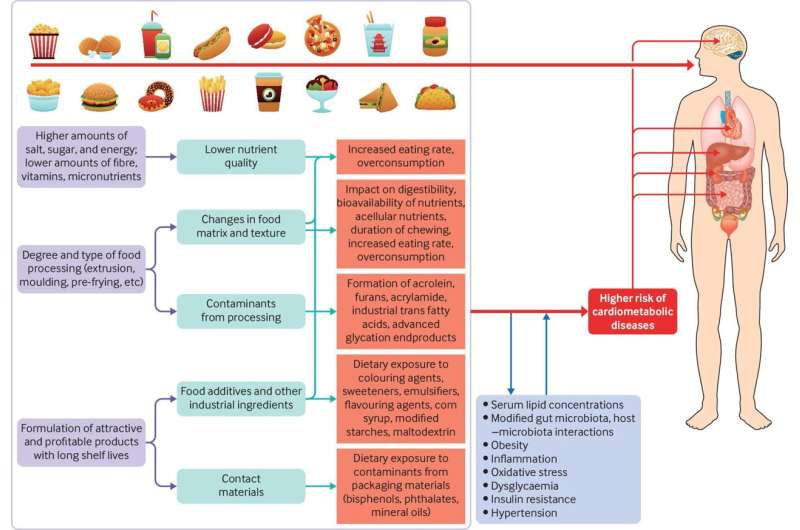
A team led by researchers from the Université Sorbonne Paris Nord and Université Paris Cité, France, has summarized where we are in our understanding of the adverse health effects related to ultra-processed food with some suggestions of how to move forward with this information.
In their paper, “Ultra-processed foods and cardiometabolic health: public health policies to reduce consumption cannot wait,” published in BMJ, the authors point out that while there is convincing evidence that processed foods have adverse health risks, efforts to reduce, change or eliminate these food formulations lack sufficient support.
Increasing evidence links the consumption of ultra-processed foods to various health issues, such as altered lipoprotein profiles, obesity, type 2 diabetes, and cardiovascular diseases.
While many studies have connected the effects of diet on health, the researchers note that this is often from a nutrient-based perspective. This perspective focuses on total fat, saturated fat, dietary cholesterol, calories, sugar, salt, dietary fiber, vitamins, and minerals.
The problem with this approach is it does not address or differentiate the intensity of processing of food formulations, essentially eliminating a known health risk from data collection.
In an example given in the paper, the nutritional makeup of a variety of vegetable soups may be regarded as the same in a nutritional study, regardless of whether they were homemade versus industrially canned or dehydrated and processed to contain food additives and flavors with industrial substances not usually found in domestic kitchens.
To clinicians and consumers alike, vegetable soup in a study is vegetable soup, and the distinctions between healthy diet choices and junk food disguised as healthy are not easily determined.
More than 70 long-term prospective epidemiological studies cited in the paper have consistently linked consuming ultra-processed foods with weight gain and increased risk of various diseases, particularly cardiometabolic conditions.
It has also been suggested that these foods meet the criteria to be labeled as addictive substances using the same standards set for tobacco products. A warning label on vegetable soup might help consumers make the right choices for their dietary needs.
The authors recommend that a combination of government policies and regulations to promote the production and availability of minimally processed foods, limitations on the marketing of ultra-processed foods, and consumer education about the adverse effects of ultra-processed foods are all needed to address the issue.
They highlight that research, specifically publicly funded research independent of the food industry, is needed to identify specific processes and substances contributing to the adverse effects.
Some candidate toxins are already known to be present, such as furans, heterocyclic amines, polycyclic aromatic hydrocarbons, acrolein, advanced glycation end products, industrial trans-fatty acids, and acrylamide.
Ultra-processed foods also tend to have longer shelf lives, a positive for reducing food waste. Still, this could result in the leaching of contaminants such as phthalates, bisphenols, mineral oils, and microplastics from the packaging or interior lining of cans. Studies have suggested that these contaminants alone may have carcinogenic properties, with increased risk of cardiovascular disease, obesity, insulin resistance, and type 2 diabetes.
The many food additives in ultra-processed foods may also have detrimental effects. Several studies in animal models and humans cited in the paper have suggested harmful health effects for some of the roughly 330 additives currently approved for use in Europe. There are associated observations of inflammation, DNA damage and triggering of gut microbiome dysbiosis.
Microbiome dysbiosis is a disruption of the gut microbiota ecosystem characterized by a loss of beneficial microbiota or an overgrowth of harmful microbiota. This can lead to intestinal inflammation and a compromised gut barrier, allowing unwanted interactions between constituents of the gut and the immune system.
The authors suggest it is time to inform consumers about the adverse effects of ultra-processed food. They urge governments to take ambitious and decisive action, with immediate public health outreach to help citizens identify ultra-processed foods and limit their exposure. In the paper’s final sentence, the authors state the urgency of action directly, “Everyone’s health is at stake.”
More information:
Mathilde Touvier et al, Ultra-processed foods and cardiometabolic health: public health policies to reduce consumption cannot wait, BMJ (2023). DOI: 10.1136/bmj-2023-075294
© 2023 Science X Network
Citation:
Time to inform the public about the adverse effects of ultra-processed foods, researchers say (2023, October 26)
retrieved 26 October 2023
from https://medicalxpress.com/news/2023-10-adverse-effects-ultra-processed-foods.html
This document is subject to copyright. Apart from any fair dealing for the purpose of private study or research, no
part may be reproduced without the written permission. The content is provided for information purposes only.
